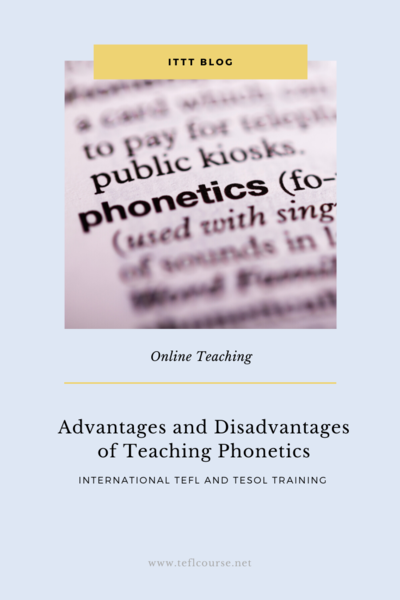Advantages and Disadvantages of Teaching Phonetics

This will be a discussion aimed at presenting both the advantages and disadvantages of teaching phonetics. We will show how teaching phonetics help create approachability and reinforce language similarities. Inversely we will look at how English suffers from inconsistent phonetic rules and the conflict between words as written and words as said. We will also look at methods to mitigate these issues.
Table of Contents
Noticing language similarities
Do you want to teach English abroad? Take a TEFL course!
This post was written by our TEFL certification graduate Mitchell D. Please note that this blog post might not necessarily represent the beliefs or opinions of ITTT.
Self-awareness
Teaching phonetics help create an approachability towards English. This gives new learners confidence when approaching the language fostering a greater willingness to learn, which is especially true for Language not derived from Roman characters. Strictly controlled vocabulary lists and limited exposure to non-phonetic words ensure that English remains more approachable. This will keep engagement high and help students from feeling left behind. A lesson activity that will help facilitate the student's understanding of phonetics would be an 'unscramble the word' type game. However, words are broken up into syllables instead of letters and the students try to make as many words that they can be using the disconnected syllables.
Also Read: 6 Teaching Skills to Support Your Students Learning Process
Noticing language similarities
Teaching phonetics also helps to reinforce language similarities between English and the student's first language. For Latin derivative languages it also provides the benefit of highlighting the fact that although the two languages seem similar there are still distinct differences. Doing activities like pronunciation race games would help drive home theses similarities as students race to be the first to pronounce the words.

English rules
On the other hand, English phonetic rules are inconsistent and contain many exceptions. Sounding out individual letters within words doesn't always create the correct sound. With words such as 'know', learning the phonetic sounds of each letter may further hinder the learner's progress with the language. Thus, there is no other course but to teach these words individually as they come up. This can be especially difficult for students who like to follow rules, leading to confusion and frustration at the inconsistencies. By teaching example exceptions alongside phonetic patterns, it creates a foundation of understanding that not all letters always sound the same. This can be assisted through the use of a memory style game where words that have the same sound, but not the same spelling, need to be matched.
Also Read: Top Reasons Why Rules of Pronunciation are Extremely Important for Teachers
Students can become confused when writing words they have only heard spoken. This is because many English sounds have multiple ways they can be spelled. Common sounds that can confuse include 'action' words, such as decision and solution, as well as 'air' words like pair and fare. Similarly, when the same letters produce different sounds students can find themselves losing confidence and motivation. This is further compounded when learning words that have multiple pronunciations with the same spelling such as; live and bow. To avoid confusing students extreme care needs to be taken when teaching vocabulary and phonetics with specific focus being placed on these cases. An example of lesson activity to help reinforce the student's comprehension is to have them create a short comic using one of the words with multiple pronunciations in the wrong context for humourous results.
Do you want to teach English abroad? Take a TEFL course!
We looked at how teaching phonetics help create approachability and reinforce language similarities while addressing how English suffers from inconsistent phonetic rules and the conflict between words as written and words as said. Example lesson activities were provided to demonstrate both how to capitalize on the advantages and mitigate the disadvantages.
Apply now & get certified to teach english abroad!
Speak with an ITTT advisor today to put together your personal plan for teaching English abroad.
Send us an email or call us toll-free at 1-800-490-0531 to speak with an ITTT advisor today.
Related Articles:
- The 8 Best Countries in Asia for Teaching English Abroad
- The How-To Guide to Prepare for Your Teaching Job Abroad
- Top 10 Cities in Asia with the Highest Demand for English Language Teachers
- Online or In-Class - Which TEFL Course Should You Take?
- Top 5 Off-The-Beaten-Track Countries for Teaching English Abroad
- The Most Common Problems Students in China Face When Learning English




